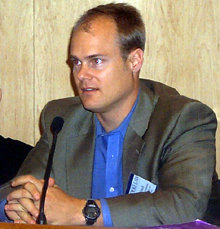Intellectual Property Symposium
The Second Annual Hot Topics in Intellectual Property Symposium, held at Duke Law School on March 21, joined nine speakers from private practice and from all three branches of government to discuss current issues in copyright and patent law. More than 70 legal practitioners, faculty members and students participated.

|
| Alec French, counsel on the House Judiciary Subcommittee on Courts, the Internet, and Intellectual Property, spoke about copyright law |
One panel discussion examined the limits of copyright law, stressing that copyright protection does not impede new efforts of creation. “Copyright law only covers an individualized expression of an idea, not the idea itself,” said Alec French, counsel on the House Judiciary Subcommittee on Courts, the Internet, and Intellectual Property.
Copyright law pioneer and University of Georgia School of Law Professor L. Ray Patterson raised the novel theory that personal use of copyright material is protected by the First Amendment and therefore distinct from fair use, which encompasses only commercial use. “Why has personal use as a constitutional right not been acknowledged?” asked Patterson. “The reason is that it was an integral part of copyright from the beginning; it has always been assumed but not articulated.”
“While [Patterson] didn’t persuade me, I thought it was interesting to hear something new,” said David Sar, an intellectual property lawyer with Brooks Pierce McLendon Humphrey & Leonard. Sar said of the event: “It’s a good reminder about certain aspects of copyright law; it’s interesting to get the different perspectives of people.”
The Honorable Stanley Birch of the United States Court of Appeals for the Eleventh Circuit discussed the utility of copyrights for lawyer-produced work product. French and Dean Marks, senior counsel for intellectual property at AOL Time Warner, each spoke to issues involving the effects of new technology on copyrighted works.
Joseph M. Beck, a partner at Kilpatrick Stockton, LLP in Atlanta played extensive media clips to illustrate his points, including Roy Orbison’s “Pretty Woman” back-to-back with a “transformative” version of the same song by the band 2 Live Crew.
French commented on the copyright panel, “Listening to Professors Lange and Patterson describe the development of the transformative use doctrine from ancient law review articles to judicial footnotes to Supreme Court precedent was riveting.”
Discussion during the patent session ranged from recent Supreme Court decisions on patent law and procedure to tips on succeeding at the trial level. Speakers included David Long, counsel at Howrey Simon Arnold & White, LLP, in Washington, D.C.; Nicholas P. Godici, commissioner for patents, U.S. Patent and Trademark Office (USPTO); James Lampert, a partner at Hale and Dorr, LLP, in Boston; and the Honorable Terrence W. Boyle, Chief Judge for the Eastern District of North Carolina.

|
| The Honorable Terrence W. Boyle, Chief Judge for the Eastern District of North Carolina, was among the distinguished guests |
Godici, who also has served as acting director of the USPTO since his appointment as commissioner in 2000, is leading the USPTO's transition to an all-electronic patent application process. “We live in a paper world and need desperately to move to an electronic world,” he said. Godici also has pushed for the USPTO to strengthen credentialing of primary patent examiners by requiring them to take the patent bar exam.
The Hot Topics Symposium was organized by the student-run Duke Intellectual Property and Cyberlaw Society (IPCS). Sponsors included The Center for the Study of the Public Domain at Duke, Dean Katharine T. Bartlett, Professor David Lange, the law firm of Myers, Bigel, Sibley & Sajovec, the Duke Graduate and Professional Student Council, the Duke Bar Association, the Duke Law Wine Club, and the Duke Law & Technology Review.
The IPCS was created to provide a forum for students and faculty interested in intellectual property law and technology law to interact with each other and other major figures in these fields and is dedicated to bringing high-profile intellectual property experts to Duke Law School.
“In organizing this event, we tried to bring together a viewpoint-diverse line-up of speakers,” said IPCS President Mike Koenig. “On the morning copyright panel, for example, we brought in both high-protectionists and low-protectionists in order to give a balanced perspective and to spark some stimulating debate. For the afternoon patent session, we tried to achieve an analogous balance by having two cutting-edge case law discussions and two ‘nuts and bolts’ discussions.”